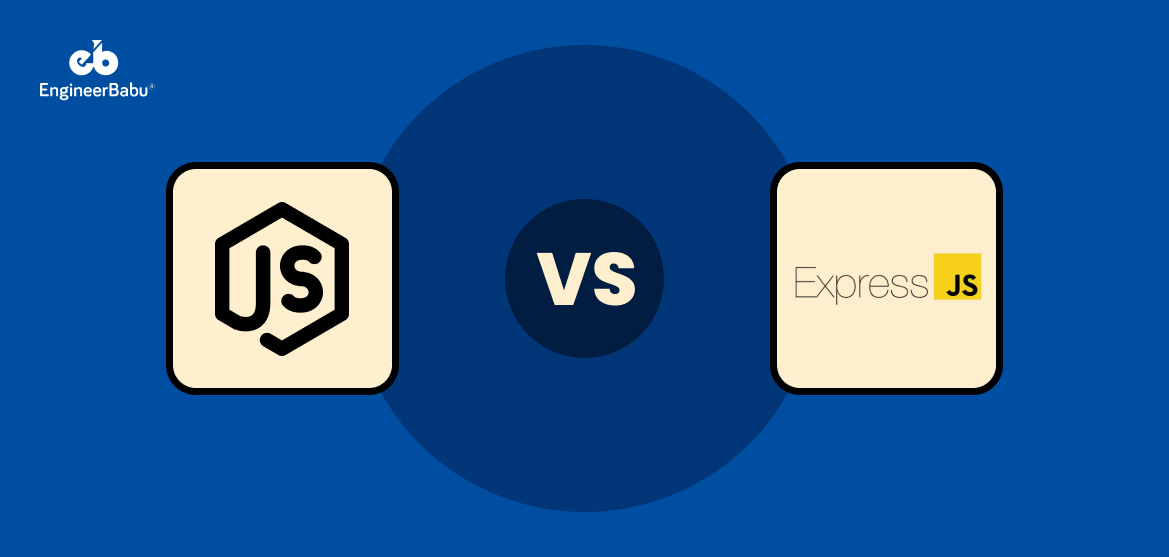When a team starts a backend project in JavaScript, one of the first big decisions is: “Should we build on Node.js directly, or use a framework like Express.js?”
The choice often shapes your architecture, development speed, and long-term maintainability.
Node.js has become a powerhouse in backend development. Today, it powers over 30 million websites, roughly 4.5 % of all known sites, and is among the fastest-growing server-side platforms.
Express.js, meanwhile, is widely adopted as the default web framework in the Node ecosystem. Over a million live sites run Express.js, and it’s involved in around 0.7% of all websites whose JavaScript library usage is tracked, according to BuiltWith Trends.
Yet even with those numbers, many developers are still confused between Node.js vs Express.js, thinking they compete. In truth, Express is built on top of Node, not in place of it.
Therefore, in this post, we’ll walk you through what both are, where they overlap, and when Express.js brings real value over vanilla Node. Let’s get started.
What is Node.js?
Node.js is a runtime environment that lets developers run JavaScript on the server, not just in the browser. It’s powered by Google’s V8 engine, which compiles JavaScript into fast, machine-level code.
This speed is one reason platforms like Netflix and LinkedIn rely on it for handling millions of concurrent users.
What sets Node.js apart is its non-blocking, event-driven architecture. Instead of waiting for one task to complete before starting another, it processes multiple requests simultaneously. This makes it ideal for chat apps, streaming platforms, and API development.
It also comes with npm, the world’s largest open-source package library, allowing developers to integrate features quickly. In short, Node.js gives JavaScript the power and scalability to handle full backend development efficiently. Thus, making it a foundation for frameworks like Express.js.
What is Express.js?
Express.js is a lightweight web framework that sits on top of Node.js and helps developers build fast, structured, and maintainable server-side applications. While Node.js handles the runtime and core features, Express.js provides a layer of abstraction that simplifies routing, middleware management, and request handling.
Instead of manually creating and managing servers with raw Node.js code, Express lets you define routes, integrate authentication, and connect APIs with just a few lines. It’s especially popular for building RESTful APIs and single-page applications because it reduces boilerplate work and improves readability.
Express.js also supports a wide range of third-party middleware, so you can add features like security, session handling, and logging without reinventing the wheel. In the ongoing Node.js vs Express.js debate, Express wins when productivity, scalability, and code organisation matter most. Hence, it makes it a go-to framework for modern web development.
Node.js vs Express.js: The Key Differences
Before jumping into the comparison, it helps to know that Express.js is built on top of Node.js. The two often work hand in hand, but each serves a distinct purpose. Understanding their differences gives you better control over how you design, build, and scale web applications.
Purpose and Functionality
Node.js runs JavaScript outside the browser, allowing Node.js developers to build high-performance, server-side applications. It provides the core environment for executing code efficiently. Express.js, on the other hand, builds on that foundation to simplify routing, middleware handling, and request management. In the Node.js vs Express.js comparison, Node is the engine, and Express is the framework that makes the journey smoother.
Architecture and Features
Node.js follows an event-driven, non-blocking architecture that makes it ideal for applications requiring speed and scalability. Express.js extends these capabilities with structured routing, robust middleware, and a modular design that accelerates development. The Node.js vs Express.js distinction becomes clear when you see how Express adds structure without compromising the performance advantages of Node.
Performance and Scalability
Node.js delivers raw speed, handling thousands of requests simultaneously using its event loop mechanism. Express.js introduces a slight abstraction layer, but the performance difference is negligible for most real-world applications. What you gain instead is clean, modular code that’s easier to maintain and scale as your application grows.
Learning Curve
Node.js has a steeper learning curve because it requires a deeper understanding of asynchronous programming and server configuration. Express.js makes the development process easier with built-in tools and clear abstractions. Many developers learn Express after Node to simplify workflows. That’s why in the Node.js vs Express.js debate, Express often wins points for accessibility and developer experience.
Community and Ecosystem
Node.js has one of the largest open-source communities, with millions of packages available through npm. Express.js benefits from this ecosystem, offering countless extensions for authentication, security, and API management. Their combined community ensures continuous improvement, strong support, and easy integration for developers worldwide.
Comparison Table: Difference Between Node.js and Express.js
Here’s a quick look at the comparison between Node.js vs Express.js and how the two differ in structure, purpose, and usage. This breakdown will help you decide which technology fits your project requirements best.
| Aspect | Node.js | Express.js |
| Type | JavaScript runtime environment | Web framework built on Node.js |
| Core Purpose | Executes JavaScript on the server | Simplifies server and API development |
| Architecture | Event-driven and non-blocking | Built on Node’s architecture with routing and middleware |
| Learning Curve | Moderate, requires backend fundamentals | Easier once Node.js basics are known |
| Performance | Extremely fast with direct control | Slight abstraction but better developer productivity |
| Built-in Modules | Offers core modules like HTTP, FS, and Path | Relies on Node’s modules and adds middleware support |
| Use Case | Backend logic, data handling, and scaling | RESTful APIs, web apps, and routing management |
| Community & Support | Large and active global developer base | Supported by the Node.js ecosystem |
| Scalability | Excellent for real-time applications | Depends on Node.js but simplifies scaling |
| Best For | Building performance-focused backend systems | Building structured, maintainable web servers |
Both complement each other perfectly. Node.js provides the foundation, and Express.js builds the framework that makes backend development faster, cleaner, and more efficient.
Related: Node.js vs Python
How Express.js and Node.js Work Together
Node.js and Express.js work best when used together. Node provides the runtime environment that executes JavaScript on the server, while Express builds on top of it to make backend development faster and more organised.
This pairing is the reason many companies prefer NodeJS development services for scalable, performance-driven web applications.
Express leverages Node’s asynchronous architecture to manage multiple client requests efficiently. Developers can use Node.js to handle core operations like database connectivity and file management, while Express manages routes, middleware, and responses. As a result, this combination keeps code clean, modular, and easier to maintain.
When combined, Node.js handles the heavy lifting, and Express adds the structure developers need for rapid application development. It’s a balance between power and simplicity.
Conclusion: Node.js vs Express.js
Node.js and Express.js are not competing technologies but complementary tools that power most modern backend systems. Node.js offers the speed and scalability needed for high-performance applications, while Express.js simplifies development with a cleaner structure and modular features.
Together, they make backend development faster, more efficient, and easier to maintain.
If you’re planning to build scalable, high-performance web applications, partnering with the right development team is crucial. At EngineerBabu, our expert team specialises in creating secure, future-ready solutions with proven Node.js vs Express.js expertise.
So, start your project with confidence, hire NodeJS developers today, and bring your product idea to life.
FAQs About Express.js vs Node.js
1. Is Express.js part of Node.js?
No, Express.js is not part of Node.js. It’s a separate framework built on top of Node.js that simplifies tasks like routing, middleware handling, and API creation.
2. Can I use Express.js without Node.js?
You can’t. Express.js depends on Node.js to run because it uses Node’s core modules and environment.
3. Which is faster, Node.js vs Express.js?
Node.js handles raw performance, while Express.js introduces minor abstraction for simplicity. In most real-world applications, the performance difference is negligible.
4. When should I use Express.js instead of plain Node.js?
Use Express.js when you want to build structured, maintainable web servers or APIs quickly without writing repetitive routing or middleware logic manually.
5. Why choose EngineerBabu for Node.js projects?
EngineerBabu provides a dedicated team of experienced remote developers skilled in Node.js, Express.js, and modern JavaScript frameworks. They deliver scalable, secure, and high-performing solutions tailored to your business goals.




